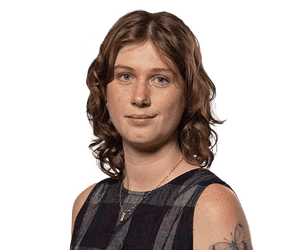Rightwing US commentator Candace Owens loses appeal over 2024 visa rejection
Rightwing commentator Candace Owens lost her high court appeal against a denied entry visa to Australia. The court found the minister for home affairs, Tony Burke, was within his right to knock back the visa after saying the provocateur may “incite discord” during her planned national speaking tour.
Australia rejected Owens’ visa application last October, ahead of a planned five-date tour in November, with events proposed in Sydney, Melbourne, Brisbane, Perth and Adelaide. Owens, whose full name is Candace Owens Farmer, has courted controversy with incendiary claims about Jewish, transgender and Muslim people, and Burke said last year it would be better for Australia’s national interest “when Candace Owens is somewhere else”.
Owens filed a suit earlier this year saying the rejection went against implied freedom of political communication.
In a lengthy ruling, the high court upheld Burke’s findings. The court said:
In the absence of evidence, or agreed facts, it is not obvious that the opportunity to hear Ms Farmer speak in Australia (the so-called “lightning bolt” effect) could add anything to political communication in Australia.
Owens will have to pay the costs of the appeal.
Key events
Benita Kolovos
Victoria premier says Sussan Ley only focused on ‘politics and division’ with comments about crime
The Victorian premier, Jacinta Allan, accused the federal opposition leader, Sussan Ley, of following in Peter Dutton’s footsteps as she visits Melbourne today to talk about crime.
Ley told the Today Show earlier this morning she was in Melbourne to call for tougher sentencing laws and described crime in the state as “out of control”.
When Allan was asked about the visit, she acknowledged there was “more to do” in tackling the “repeat pattern of brazen, dangerous and shocking behaviour” causing community concern but described Ley’s visit as “purely politics”.
She went on:
We’re seeing from the current leader of the opposition that she’s following the same anti-Victorian pattern of behaviour that the federal Liberal party have perpetrated on Victoria year after year after year … We know she’s not focused on what’s best for Victoria. She’s only focused on bringing politics and division, which is so typical of the Liberal party, whether it’s the federal Liberal party or the state Liberal party, they’re all about punching down on Victoria and Victorians.
We’ve got a lot of work to do here in Victoria and Victorians deserve better than this reckless, divisive politics that we’re seeing time and time again from federal and state Liberal party members.

Andrew Messenger
Pill-testing service says ability to test drugs ‘first line of defence’
Cameron Francis, CEO of The Loop, which operated one of Queensland’s pill-testing services, said pill-testing is the “first line of defence”:
Without pill testing, we don’t know that these dangerous drugs are circulating until it’s too late and someone has overdosed.
When governments shut down harm-reduction services, the drug market doesn’t disappear – it just becomes even more dangerous and unpredictable.
Nitazenes are becoming more common across the community. Without pill-testing, we have no way to track their spread, and respond with information and alerts for the community.
Coroners and health professionals have repeatedly recommended adopting pill-testing as an early warning system for dangerous drugs on the market. One person has died as a result of synthetic opioids since the ban so far.

Andrew Messenger
Queensland Health issues health warning of new dangerous drug, weeks after state bans pill-testing
Queensland Health has issued a public health alert after discovering new synthetic drugs, weeks after the state government banned pill-testing.
State parliament stepped in last month to prevent a charity providing the service at no cost to the taxpayer, after the new Liberal National party government closed two state-funded services. The party did not permit debate on the decision in parliament before passing the law on party lines late at night by amending an unrelated bill.
Queensland Health warned of the discovery of 5-cyano isotodesnitazene, a new, rare type of nitazene. Nitazenes are a form of synthetic opiate, akin to heroin or fentanyl, but are stronger and can produce life-threatening toxicity in small amounts.
The sample is a white powder in a plastic bag marked “opioid 5F”. The drug has only been previously discovered in Australia at Canberra’s pill-testing clinic and is so novel there is limited data on its potency or toxicity.
AEC told of harassment and intimidation at 2025 election

Josh Butler
The Australian Electoral Commission (AEC) received thousands of complaints about political campaigners at the last election including harassment, spam texts and voter intimidation.
The AEC is appearing before the federal parliament’s joint standing committee on electoral matters this morning. Its written submission to the hearing says it received more than 2,200 complaints about political parties, “including spam SMS messages, postal vote applications, advertising and campaign worker behaviour”. The submission said:
Of those complaints, 550 related to voter harassment and intimidation by campaign workers. This included aggressive and pushy behaviour, being bombarded with signs, blocking walkways, asking individuals their voting intentions, and yelling.
The AEC commissioner, Jeff Pope, told the committee chair, Labor MP Jerome Laxale, that some voters may have been intimidated by a “sea of corflutes” – or plastic election signs – at some polling booths. He said he had “never seen more corflutes” at some polling places, and that the AEC received reports of voters saying they found that environment intimidating or difficult to navigate.
Pope also said the 2025 election had seen a rise in “issue-based groups” outside of political parties, becoming a bigger feature of the election system. He didn’t name any specific groups, but noted that third-party campaign groups were becoming more common in backing certain issues, candidates or just seeking “media attention”.
Victoria experiences triple-zero computer outage overnight

Benita Kolovos
A power outage in Victoria knocked out triple-zero’s dispatch software overnight, with call-takers forced to use pen and paper to take notes.
The premier, Jacinta Allan, says she has been advised there were no impacts during the outage, which lasted several hours and is being investigated.
She says:
At triple zero, there are extensive and intensive backup protocols for the highly trained staff to deploy should a situation like this arise, as it has overnight. The cause of the power failure is still being investigated. I’ve not got any advice that there was any impact on the community. If there is, of course, that information will be updated over the course of today.
Allan thanked staff for responding quickly:
They’re also highly trained to respond to situations when they arise, and the advice is that the call-taking was not interrupted as a result of this power outage, because the backup protocols were quickly enacted.
Australia Post announces deadlines for sending holiday mail
Australia Post has announced its deadlines to see deliveries make it in time for Christmas.
Within Australia, parcels sent via Parcel Post need to be mailed by 22 December for same-state arrivals and 19 December for interstate. Sending to and from Western Australia, the Northern Territory, Tasmania or regional and remote locations should allow for a few extra days.
Christmas letters and cards need to be posted by 18 December for same state and 16 December for interstate.
Internationally, AusPost needs your parcels by 21 November to 5 December for Economy Air, depending on location. International Express parcels have a bit more wriggle room and need to be received by 5 to 18 December.
All sending dates are available here.
SA premier says ‘perception’ of algal bloom now doing as much damage as ‘the bloom itself’
The South Australian premier, Peter Malinauskas, spoke to RN Breakfast this morning about the state’s new, $102m effort to protect coastlines and support coastal communities amid the ongoing algal bloom.
He said the state had established a communication system to track beach safety during the bloom, but stressed for many regions swimming was safe:
First and foremost, we’re seeking to provide the community, both South Australian but also visitors from abroad, that by and large it is safe to swim in our beaches unless there’s reason not to … you know, the overall majority of our coastlines are unaffected.
I think we’re at a point now in South Australia where the perception of the algal bloom is probably doing as much damage as the bloom itself. That’s not to downplay the bloom. It’s real and having an impact and continues to in the marine environment. But it’s also true that the perception of it in some quarters is exaggerated.
Malinauskas was asked when residents and travellers should expect the bloom to end. He said:
We just don’t know what’s going to happen. The trend is heading in the right direction, it’s impossible to account for what happens.
Head of Aboriginal Legal Service says NSW government should be ‘ashamed’ by deaths in custody figures
Karly Warner, the chief executive of the Aboriginal Legal Service, just spoke to ABC News about the record deaths in custody. She said:
The New South Wales Government should be absolutely ashamed of this record, but they also can’t say that they didn’t know.
We warned them and have continued to warn them that as a result of the New South Wales government driving increases in incarceration of Aboriginal women and children and men through punitive laws and policing practices, that it would lead to tragic consequences and we are seeing those tragic consequences.

Jordyn Beazley
Aboriginal Legal Service says figure a ‘crisis and a preventable tragedy’
The Aboriginal Legal Service has responded to the news that a record number of Aboriginal and Torres Strait Islander people have died in custody in New South Wales this year.
The service’s chief executive, Karly Warner, said:
We call on the Government to stop passing laws which contradict its obligations to reduce Aboriginal over-representation in police cells, courts and prisons, and instead work in partnership with Aboriginal communities to implement evidence-based, community-led solutions to reduce imprisonment.
This is a crisis and a preventable tragedy that should deeply alarm everyone in NSW. A prison sentence should not be a death sentence.
Despite committing to reduce the mass incarceration of Aboriginal people under the National Agreement on Closing the Gap, the NSW Government continues to double down on laws and policing which guarantee increased imprisonment – instead of preventing people from entering prison in the first place by meeting their needs and investing in vital community-based supports.
Highest number of Aboriginal and Torres Strait Islander people die in custody in NSW

Jordyn Beazley
A record number of Aboriginal and Torres Strait Islander people have died in custody in New South Wales so far in 2025, with more than two months still left in the year.
The NSW state coroner, Teresa O’Sullivan, took the rare step of releasing a statement about the “profoundly distressing milestone” of reaching a record 12 deaths in custody this year:
These are not mere statistics. Each of these deaths represents a person whose life mattered and whose loss is felt deeply by families, loved ones and communities across the state. They are individuals whose deaths demand independent and careful scrutiny, respect and accountability.
She said the surging prison population showed “underscores the scale of the issue”:
Over the past five years, the number of Aboriginal people in custody has increased by 18.9 per cent, while the non-Aboriginal prison population has declined by 12.5 per cent. Nearly half of Aboriginal adults in custody (45.6 per cent) were on remand or refused bail awaiting further court outcomes. The number of Aboriginal people on remand has surged by 63 per cent over the same five-year period.
These figures reflect the entrenched over-representation of First Nations peoples in the criminal justice system – a systemic issue that compounds the risks and vulnerabilities contributing to the rising number of deaths in custody.

Adeshola Ore
Employers prefer candidates from ‘elite’ universities, survey reveals
More than half of human resources and diversity practitioners say their employers prefer candidates from “elite” universities, a survey reveals.
Diversity Council Australia’s latest study of class inclusion at work, released today, found 58% of HR and diversity practitioners surveyed said their organisation favours candidates from elite universities, with some saying they use this to filter out applications during recruitment.
The council’s research also found “class marginalised workers” – those in the lowest 20% of household incomes – were less likely to experience inclusion at work.
DCA’s chief executive, Catherine Hunter, said these findings challenge the notion that Australia is a class-free society:
Your social class shouldn’t determine your career opportunities, yet our research shows class bias still impacts who gets ahead and who is left behind.
The findings are drawn from survey responses of about 1,400 Australian workers and diversity practitioners and a nationally representative sample of 3,000 Australian workers.

